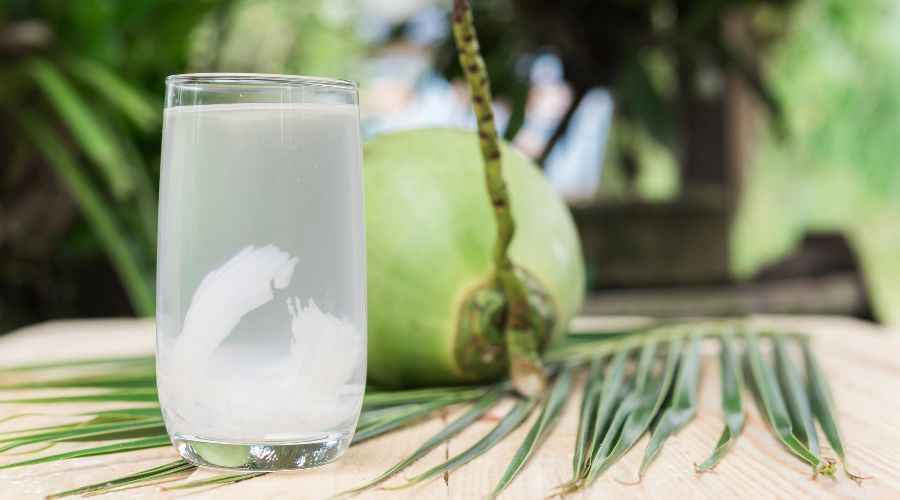Is Coconut Water Good for Diabetes? Check Now

Medically Reviewed By
Dr Divya Rohra
Written By Kirti Saxena
on May 27, 2024
Last Edit Made By Kirti Saxena
on Jul 19, 2025

Coconut water is a clear, water-like liquid found inside coconuts. It comprises 95% water and contains many nutrients, including minerals, vitamins, dietary fiber, healthy fats, and electrolytes.
It is known as a hydration drink, which has numerous health benefits. In addition to providing health benefits, it is also a tasty and rejuvenating drink that serves as a great alternative to soda and other artificially sweetened drinks.
If you want to know more about this amazing beverage and its benefits for diabetic people, just sit back, relax, and keep reading because we have covered it all in this article.
Nutritional value of coconut water
Coconut water is a nutritious beverage containing various essential nutrients. Here is a list of nutrients present in coconut water, along with their nutritional value per 100g serving:
|
Nutrients |
Nutritional value(per 100g serving) |
|
Water |
95 g |
|
Calories |
19 kcal |
|
Fat |
0.2 g |
|
Protein |
0.72 g |
|
Carbohydrates |
3.71 g |
|
Iron |
0.29 mg |
|
Fibre |
1.1 g |
|
Sugar |
2.61 g |
|
Calcium |
24 mg |
|
Magnesium |
25 mg |
|
Potassium |
250 mg |
|
Sodium |
105 mg |
|
Manganese |
0.142 mg |
|
Vitamin C |
2.4 mg |
|
Riboflavin |
0.057 mg |
Source: USDA

Have a look at these health benefits of coconut water for Diabetics
Coconut water is a great beverage loaded with essential nutrients and is healthy for diabetic people, too. Here are some health benefits of coconut water for diabetic people:
- Low Glycemic Index
Coconut water has a low glycemic index and does not spike blood sugar levels, making it suitable for people with diabetes. Unsweetened, natural coconut water has low sugar and is a refreshing alternative to soda and other sugary drinks.
- Rich in Antioxidants
An increase in free radicals in our body can lead to oxidative stress, which is known to cause many diseases. Coconut water contains antioxidants such as polyphenols and flavonoids, which help neutralize these free radicals in our body. This further helps prevent any related complications in diabetic conditions.
- Regulates blood sugar levels
Coconut water contains dietary fiber, minerals, vitamins, and healthy fats. These nutrients slow down blood sugar absorption, preventing spikes in blood sugar levels.
They also improve insulin sensitivity, making the body more responsive to insulin.
- High in Electrolytes
Coconut water contains natural electrolytes such as potassium, manganese, and sodium. A 100g serving has around 250 mg of potassium. Potassium is a crucial mineral that helps with muscle contraction and kidney function.
It also contains sodium, an electrolyte lost in sweat. This makes coconut water a good alternative to sports drinks.
- Boosts metabolism
Coconut water is low in carbohydrates and calories and helps keep you full for longer. It also contains dietary fiber and bioactive enzymes, which aid digestion and increase metabolism. An increased metabolic rate helps break fats down easily.
- Other Health Benefits
The health benefits mentioned above make coconut water a perfect drink for diabetic people. Apart from the health benefits for diabetics, here are some other benefits of this refreshing beverage:
- Boosts energy levels
- Improves kidney function
- Enhances blood circulation
- Helps in weight loss
- Lowers risks of heart diseases
- Aids in Digestion
- Promotes healthy skin
Also Read: Benefits of Coconut Water: Nourishing Hydration and Wellness
Considerations for diabetics
Although coconut water is a very healthy, refreshing drink suitable for diabetic people, they should still be aware of their medical conditions and dietary habits and pay close attention to the following things:
- Portion Control
Coconut water can be a great beverage for diabetics if consumed in moderation. It is recommended that diabetics consume a maximum of 1-2 cups daily.
An excessive intake may cause a spike in blood sugar levels, as it does contain small amounts of natural sugar.
- Prefer Unsweetened Coconut Water
Diabetic people should only consume unsweetened, natural coconut water. Artificially sweetened or processed coconut water usually contains high levels of artificial sweeteners and other forms of sugar.
This type of coconut water is unsuitable for diabetic people as it contains sugar levels similar to those of soft drinks and processed juice.
- Consult a medical professional.
Although coconut water is generally safe for diabetic people, it is still important to consider your medical conditions and consult your physician or dietician before including this beverage in your daily diet to avoid complications.
If you have kidney issues, you should not consume coconut water before consulting with a doctor, as it contains high amounts of potassium.

Some Tests for Diabetes
Diabetes has become a common disease nowadays. This is why it is important to get tested for diabetes regularly to prevent diabetes and keep track of our blood sugar levels. The only way to find out if you have diabetes is through blood tests. Here are some important blood tests for diagnosing diabetes:
- Hb1Ac test: This is one of the main tests for diagnosing diabetes. It is used for testing your average blood sugar levels for the last 2-3 months.
- Fasting Blood Sugar: This test needs you to fast for at least 8 hours before a blood sample is collected from your veins. It is used to test for your fasting blood sugar levels.
- Glucose Tolerance Test: This test involves two parts. First, your fasting blood sugar levels are tested. After that, you are required to consume a sugary drink. After two hours of drinking, your blood sugar levels are measured again.
Key Takeaway
Coconut water is a natural, refreshing beverage that provides many health benefits for diabetic people. However, people must drink it in moderation and consult a medical professional before including it in their daily diet.
It is also crucial to keep track of your blood sugar levels and get them checked regularly.
We at Redcliffe Labs provide multiple tests, from Fasting blood sugar to HbAst, to help you stay updated on your blood sugar levels and prevent or control diabetes. Today, book a blood sugar test at Redcliffe Labs- “Healthy India ki trusted labs”!
FAQs
1. Can diabetic people drink coconut water daily?
Yes, it is generally safe for diabetic people to consume coconut water daily. It is beneficial to drink 1-2 cups of coconut water daily. However, excessive consumption might be harmful to your health. Hence, it is necessary to consume coconut water in moderation.
2. Does coconut water spike blood sugar levels?
Not. Coconut water has a low glycemic index, which helps the gradual increase of blood sugar levels. It also helps regulate blood sugar levels and promotes enhanced response to insulin. Although, it is important to drink unsweetened, natural coconut water without any added sugars.
3. Which coconut water is best for people with diabetes?
Natural, unsweetened coconut water is the most suitable for diabetic people. It has low amounts of natural sugar and no artificial flavors or additives. Processed or artificially sweetened coconut water can be unhealthy for people with diabetes.
4. Does coconut water have electrolytes?
Yes. Coconut water naturally contains many nutrients, including minerals like potassium, sodium, calcium, and magnesium. These minerals are classified as electrolytes, and they help with various body processes and functions.
5. Does coconut increase insulin levels?
Coconut water helps regulate blood sugar levels and increases the body’s response to insulin. However, there is no evidence that coconut water directly increases or decreases insulin levels.
Leave a comment
2 Comments
Teye Samuel
Jan 28, 2025 at 10:08 PM.
I take 2 or 3 coconut a day Now, which one sweet and which one is unsweetened?
Myhealth Team
Jan 30, 2025 at 12:04 PM.
If you’re consuming tender coconut, it’s naturally sweet with refreshing water. Mature coconut is less sweet with thick, firm flesh.
V Venkatesan
Sep 4, 2024 at 2:58 PM.
Super
MyHealth Team
Sep 4, 2024 at 5:28 PM.
We are glad you have liked the information!



